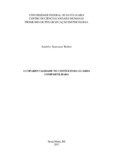| dc.creator | Weber, Andréia Sorensen | |
| dc.date.accessioned | 2021-04-16T00:56:09Z | |
| dc.date.available | 2021-04-16T00:56:09Z | |
| dc.date.issued | 2017-12-11 | |
| dc.identifier.uri | http://repositorio.ufsm.br/handle/1/20599 | |
| dc.description.abstract | It is considered that, faced a conjugal separation, the family will experience a complex, painful process of mourning and readjustment of roles and functions. In the midst of the breakdown of the marital relationship, in cases which the couple have children, it is necessary to reflect how the father and mother will begin to exercise their parent functions in this new context of life. This study aimed to understand the experience of co-parenting from the perspective of separated parents who have shared custody of their children. To do so, a research was developed with three couples (three fathers and three mothers) who had lived together, but at the time of the research were separated and had at least one child up to 11 years old, with shared custody regulated by the Law. The participants resided in a city in the interior of the State of Rio Grande do Sul (Brazil). To collect data, the participants were asked to respond to a sociodemographic questionnaire and an individual interview divided into two moments, the first one addressed questions concerning post-divorce co-parenting, while the second dealt with aspects of co-parenting linked to marriage and the separation of the couple. Through the results it is believed that the way of conflictive coexistence by living togheter in marital relations has affected the quality of the development of coparental exercise in post-divorce. It is understood that aspects of the conjugal relationship influence and compromise the way of performing the co-parent relationship. Psychology can contribute to the broadening of the discussion about coparental exercise through shared guarding, implementing the theme in group and individual spaces and through means of dissemination and exchange of information. Not least, advances in research related to the theme will bring further clarification. | eng |
| dc.language | por | por |
| dc.publisher | Universidade Federal de Santa Maria | por |
| dc.rights | Attribution-NonCommercial-NoDerivatives 4.0 International | * |
| dc.rights.uri | http://creativecommons.org/licenses/by-nc-nd/4.0/ | * |
| dc.subject | Coparentalidade | por |
| dc.subject | Guarda compartilhada | por |
| dc.subject | Separação conjugal | por |
| dc.subject | Coparentality | eng |
| dc.subject | Shared custody | eng |
| dc.subject | Conjugal separation | eng |
| dc.title | A coparentalidade no contexto da guarda compartilhada | por |
| dc.title.alternative | Coparentality in the shared guard's context | eng |
| dc.type | Dissertação | por |
| dc.description.resumo | Frente à separação conjugal, nos casos em que o casal possui filhos, faz-se necessário refletir sobre a forma com que pai e mãe passarão a exercer suas funções parentais neste novo contexto de vida. Este estudo teve como objetivo compreender a experiência da coparentalidade na perspectiva de pais separados que possuem a guarda compartilhada dos filhos. Para tanto, realizou-se uma pesquisa com três casais (três pais e três mães) que haviam vivido conjugalmente, mas que no momento da pesquisa estavam separados e possuíam ao menos um filho(a) de até 11 anos, com estabelecimento de guarda compartilhada. Os participantes residiam em uma cidade do interior do Estado do Rio Grande do Sul (Brasil). Para a coleta de dados, os participantes foram solicitados a responder a um questionário de dados sociodemográficos e duas entrevista individuais, a primeira abordou questões referentes à coparentalidade no pós-divórcio, enquanto a segunda abordou aspectos da coparentalidade ligados ao casamento e à separação do casal. Os resultados indicaram que o modo de convivência conflituoso nas relações conjugais tenha afetado a qualidade do exercício coparental no pós-divórcio. Compreende-se que aspectos da relação conjugal influenciam e comprometem o modo de realizar a relação coparental. A psicologia pode trazer contribuições para a ampliação da discussão acerca do exercício coparental em meio a guarda compartilhada, implementando a temática em espaços grupais e individuais e através de meios de divulgação e de trocas de informações. Não menos importante, avanços nas pesquisas relacionadas a temática trarão maiores esclarecimentos. | por |
| dc.contributor.advisor1 | Pereira, Caroline Rubin Rossato | |
| dc.contributor.advisor1Lattes | http://lattes.cnpq.br/1255468125800328 | por |
| dc.contributor.referee1 | Arpini, Dorian Mônica | |
| dc.contributor.referee2 | Grzybowski, Luciana Suárez | |
| dc.creator.Lattes | http://lattes.cnpq.br/8023217302525156 | por |
| dc.publisher.country | Brasil | por |
| dc.publisher.department | Psicologia | por |
| dc.publisher.initials | UFSM | por |
| dc.publisher.program | Programa de Pós-Graduação em Psicologia | por |
| dc.subject.cnpq | CNPQ::CIENCIAS HUMANAS::PSICOLOGIA | por |
| dc.publisher.unidade | Centro de Ciências Sociais e Humanas | por |



